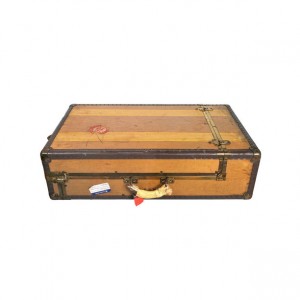The Motive for Metaphor
 by Tim Tomlinson
by Tim Tomlinson
What happened that day in his therapist’s office still surprised him years later, years after he’d left therapy, years after his therapist had died.
Theo—he was on a first name basis with this therapist, unlike some of the others; Dr Pine, for instance, that monumental asshole whom Maris had seen for close to six years and never once called by his first name, and neither had Dr Pine used his, it was always “Mr Dea,” this, and “Dr Pine” that, with his brown shoes and his Windsor-knotted ties—Theo had asked him to bring a poem into a session, a poem he might want to talk about, a poem that, for some reason, it didn’t have to be clear, did something for him, “made him feel exposed” was how Theo put it, “made him feel wide open.” Maris brought two copies of Wallace Stevens’s “The Motive for Metaphor.” He’d expected to discuss it, like in a graduate school seminar, parse its lines, uncover its influences, excavate its mysteries. Theo declined his copy, and asked instead for Maris to read the poem aloud.
Maris hesitated. “I’ll feel like I’m at an audition,” he said.
“It’s OK,” Theo told him. “You already have the part.”
This was New York, Theo worked with numerous actors, he knew all about audition anxiety.
Maris took a breath. He set his elbows on his knees.
“You like it under the trees in autumn,” he began, and already he could feel something happening, his throat thickening, his pulse hammering. “Because everything is half dead.” There he came to a stop—he could hardly breathe.
“I can’t,” he told Theo. His hands shook.
Theo said, “OK, OK. Now continue, please.”
And Maris tried. But something had a hold of him. It quickened, then robbed, his breath. He got through the first verse, he began the second.
“You were happy in spring,” he read, “With the half colors of quarter-things.”
And at “quarter-things” he stopped, at “quarter-things” it was as if he’d been slugged in the gut, in the solar plexus, and he doubled over in sobs that wracked his body, sobs he couldn’t control, that frightened him in their depth, that took his breath the way a sudden and long fall can, and you wonder not when you’ll get it back but if. And when it returns it’s a huge insucking gasp and you explode in sobs even more convulsively, even though you know that the sobs are sucking the water from the shoreline, as it were, the way a tsunami drains a bay.
He saw Theo twice more after that, they never made any sense of the incident, at least not to Maris’s satisfaction. Then Maris left the country to make a film, his first shoot abroad, in Laos, a low-budget indie feature directed by a woman with a reputation in the margins of the business and a star who’d once actually been a star. He was gone longer than he’d expected—the shoot was a nightmare of mishaps that prolonged everyone’s stay well beyond their visas’ allowance. When finally they wrapped, Maris decided to travel, first into Cambodia, then Thailand. He’d left half his luggage behind in Vientiane, he couldn’t go back for it, it felt like he’d left half his life. It didn’t feel bad to lose half his life. He felt both lighter and nearer to destitute.
Half his travel involved laundromats, or washerwomen beating his clothes. He started drinking again, beer at first, then local rice and palm wines as he sat on crates in a wife-beater, watching women with weathered skin wring out his soiled shirts. The wines aggravated his ulcer. One night in Bangkok, he helped a Swedish student who was being robbed on a dark avenue alongside Lumpini Park. He traveled with her by train to Chiang Mai. They waited a week for visas to China. Her family was wealthy, she paid for everything, out of gratitude, she said. The Thai people were accustomed to seeing women like the Swedish student. But the Chinese stared at her as if they were seeing a vision, a visitation, a miracle. Some nights in bed, that’s the way he’d looked at her, too—the length of her, the yellow radiance—in disbelief. He’d reached a point in his deterioration—a hardening of the destitution he’d cultivated for two decades—that elicited sympathy from beautiful young women. They found him intriguing, romantic, woebegone. He was a cross between Tom Waits and Gary Cooper. Since leaving America, he’d punched two new holes in his belt, and still his trousers sagged.
* * *
He spent his first two weeks back in New York staring at the phone. He’d wanted to call Theo to say, let’s just have coffee or something, he’d wanted to say he was fine, that he was beyond therapy. But he knew he wasn’t, even if he didn’t know why. It wasn’t as if he heard voices, or stared into the void, say, of his refrigerator, which he used as shelving for scripts. It was just this gnawing anxiety, and the burning of his ulcer that kept him always within ninety seconds of a toilet. It was autumn, everything half-dead. He received a card from the Swedish student. She wrote of rhapsodies under the stars that night on the Yellow Mountain, he had to struggle to come up with her name. She’d become a quarter-thing.
When at last he called, he was told of Theo’s passing.
“Of AIDS?” Maris repeated, stunned.
“Complications similar to,” the receptionist said, “but no one knows…”
Maris said, “Theo was gay?”
But he hung up even as the receptionist explained something that he couldn’t hear.
It was immaterial. It was all immaterial.
He took a job as an understudy in an O’Neill play. He could always rely on something drunken or Irish. He renewed his guitar playing, restored the calluses on his fingertips. He thought about how much he’d loved Theo, how Theo had saved his life without writing a single prescription. He wondered what it meant to love a man so much. And was it reciprocated? Theo was actually younger than Maris by about three years—he found that out after Theo’s passing. All along he’d thought Theo was at least ten years older. Choices can age you, Maris thought. Choices and responsibilities, two things Maris had scrupulously avoided.
One day he was playing guitar on a bench in Tompkins Square Park. “Rex’s Blues.” A red-haired woman approached him.
“That’s Townes Van Zandt you’re playing, isn’t it?”
She had an Irish accent.
Six weeks later he moved to Los Angeles where the red-haired woman belonged to a repertory company that welcomed Maris. The New York edge, they told him, that’s what they’d been missing. Maris told them he was from Montana, which was half true, but he didn’t remember which half. You reach an age, he told them, when the lies become the truth and the truth, it never mattered anyway, at least not as much as you thought it did.
Unofficially, he became the company’s artistic director. The young actors wanted to know what he knew, which, they believed, was quite a lot. He told them about “The Motive for Metaphor,” and on the basis of his story, the company scribe wrote up a one-act with the same title. It ran for six weeks to capacity houses and critical acclaim. Maris directed himself. One night, he saw Dr Pine in the audience. On another, he could have sworn it was Theo. He remained in character until he believed he didn’t have another tear left in him for as long as he’d live.


